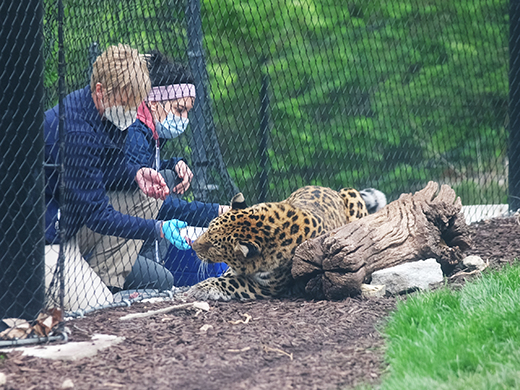Veterinary Health Center team vaccinates animals for COVID-19 at Manhattan's Sunset Zoo
Friday, June 17, 2022

Sunset Zoo's Denise LeRoux, left, large animal keeper, and Jasmine Sarvi, resident with the K-State Veterinary Health Center, inject vaccine into Vlad, an Amur leopard. | Download this photo.
MANHATTAN — This spring, Kansas State University zoo veterinarians and staff from the Sunset Zoo in Manhattan joined forces to get many of the zoo's animals protected against COVID-19.
Sara Gardhouse, assistant professor of exotic pet, wildlife and zoological medicine, said the COVID-19 vaccine for zoo animals is slightly different than the Moderna and Pfizer vaccines for humans.
"The vaccine we are using is produced by Zoetis," said Gardhouse, who is also a clinician in the Veterinary Health Center at K-State. "Zoetis has donated over 15,000 doses of this USDA authorized experimental vaccine to ensure protection of the animals in our zoos, conservation centers, academic centers and government organizations."
Gardhouse said that even though this vaccine differs in some ways from the human vaccine, it has a lot of similarities.
"The antigen, or virus, in the vaccine is the same as in the human vaccines, but the adjuvant, or the ingredient used to promote a better immune response, is different," Gardhouse said. "This allows the vaccine to be safe for use in animal species. The Zoetis vaccine requires an initial dose, followed by a booster in three weeks."
All Sunset Zoo animals that require protection have received their first dose of vaccine.
"We are in the process of administering all of their boosters now," Gardhouse said. "The Sunset Zoo has focused on vaccinating animals known to be susceptible to the virus and in which species-positive cases have been reported. This includes a large number of the mammals and primates that the zoo has."
Sunset Zoo is home to more than 150 animals, including hyenas, cheetahs, flamingos and an array of primates.
Gardhouse noted that there have been outbreaks in primates, mustelids — members of the weasel family, such as otters and ferrets — and many felidae, or cat, species in other zoos and facilities.
"The administration of vaccines to zoo animals is slightly different than administration of vaccines to humans," Gardhouse said. "For many of the animals at the Sunset Zoo, the keepers have worked hard to have them trained to receive injections."
To date, the Sunset Zoo has not seen any side effects in the animals.
"We are all thrilled that our animals are going to be protected, just like the humans that work with them," Gardhouse said.
"Sunset Zoo is grateful for the dedicated staff and leadership of the Veterinarian Health Center at Kansas State University that help give our animals excellent care, including these very important vaccines for the wellbeing of our animals," said Scott Shoemaker, zoo director.
